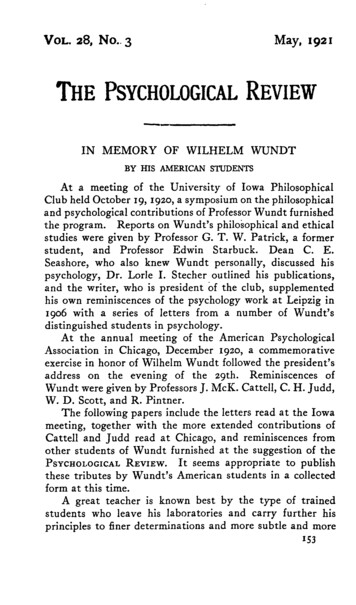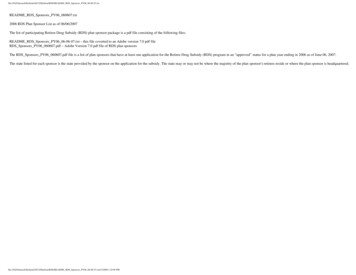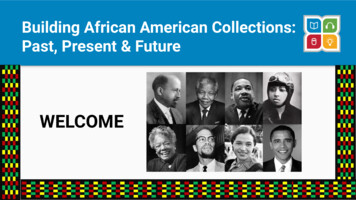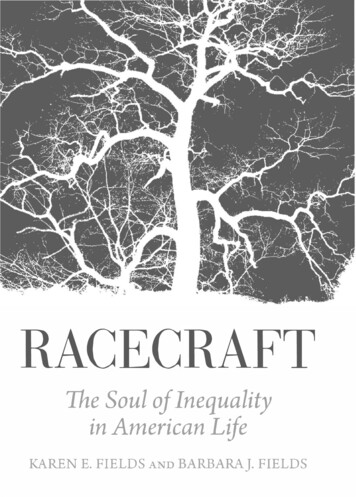
Transcription
VOL.28, No. 3May, 1921T H E PSYCHOLOGICAL REVIEWIN MEMORY OF WILHELM WUNDTBY HIS AMERICAN STUDENTSAt a meeting of the University of Iowa PhilosophicalClub held October 19,1920, a symposium on the philosophicaland psychological contributions of Professor Wundt furnishedthe program. Reports on Wundt's philosophical and ethicalstudies were given by Professor G. T. W. Patrick, a formerstudent, and Professor Edwin Starbuck. Dean C. E.Seashore, who also knew Wundt personally, discussed hispsychology, Dr. Lorle I. Stecher outlined his publications,and the writer, who is president of the club, supplementedhis own reminiscences of the psychology work at Leipzig in1906 with a series of letters from a number of Wundt'sdistinguished students in psychology.At the annual meeting of the American PsychologicalAssociation in Chicago, December 1920, a commemorativeexercise in honor of Wilhelm Wundt followed the president'saddress on the evening of the 29th. Reminiscences ofWundt were given by Professors J. McK. Cattell, C. H. Judd,W. D. Scott, and R. Pintner.The following papers include the letters read at the Iowameeting, together with the more extended contributions ofCattell and Judd read at Chicago, and reminiscences fromother students of Wundt furnished at the suggestion of thePSYCHOLOGICAL REVIEW. It seems appropriate to publishthese tributes by Wundt's American students in a collectedform at this time.A great teacher is known best by the type of trainedstudents who leave his laboratories and carry further hisprinciples to finer determinations and more subtle and more153
154IN MEMORY OF WILHELM WUNDTuseful applications. No teacher in psychology has had moredistinguished students from many countries than ProfessorWundt; and in America, where experimental psychology hasmade greatest advances during the last three decades, manyof the great leaders were students at Leipzig for short orlong periods during Wundt's creative directorship.The first two young men to work at Leipzig and later tofound psychological laboratories in this country were President G. Stanley Hall and Professor J. McK. Cattell, theformer being a student in 1879-80 and the latter in 1880-82and 1883-86. Dr. Hall founded the laboratory at JohnsHopkins in 1883 and Professor Cattell the laboratory atPennsylvania in 1887. Many of Wundt's other Americanstudents either founded laboratories on their return fromGermany or played a leading part in the development of theexperimental laboratories in America.The following contributions are arranged chronologicallyaccording to the date at which the writers were connectedwith the Leipzig laboratory. The key-note of the symposiumis Wundt's personality. No attempt is made to appraise thevalue of his scientific work; that remains for the future todetermine. In the foreground we see Wilhelm Wundt, theman and the teacher, reverenced by his pupils and inspiringthem with zeal for exact and honest scientific research.B. T. B.II think I was the first American student to work inWundt's laboratory. It was in its early days—I think about1878 or 1879—and I only served as subject, for I gave all mytime during the two years I was there to work in Physiologywith Ludwig. There was then an impression that Wundtwas not very scientific, and there were rumors that Helmholtzhad found him too inexact as his assistant. One group, Iremember, thought Horwicz should have been elected toWundt's chair. Wundt was very rarely seen in his laboratory,and impressed me as rather inept in the use of his hands.Most of his time was spent in preparing his amazingly clearand popular lectures, which were always crowded. I attended
IN MEMORY OF W1LHELM JFUNDT155his seminary, the method of which in my time was to haveevery member read and carefully epitomize books, articles,etc., assigned by Wundt, he himself, as I remember, takingnotes incessantly. I felt that our business as members ofthe seminary was chiefly to read for him, and I think thiscontributed much to the impression of the great eruditionwhich characterizes his works.Save his doctrine of apperception, it does not seem to methat he made any epoch-making contributions to psychologyalthough he will always fill a large place as the first to establishthis science on an experimental basis. He was a wonderfulcompiler and digester, and I have always felt that his Volkerpsychologie was really quite as important and involved quiteas much commendable labor on his part as did the Physiologische Psychologie.He was a very able and effective controversialist, but italways seemed to me that he was short-sighted and partisanin antagonizing the new introspective movement started byhis own pupils, as Freud has been in antagonizing Adler andthe Zurich school. Both tried to devour their own children.This antagonism seemed to me an illustration in the scholasticfield of the spirit of the old German feudal overlord.I have always felt, too, that if Wundt had been half asmuch of a biologist as he was a physiologist he would havegiven our science a broader basis, and also that he was tooprone to ignore the contributions of psychiatry.Nevertheless, he did a remarkable and epoch-makingwork, and I for one feel no less debt of gratitude to him asa psychologist even though he bitterly denounced the Alliesin a narrow and almost bigoted way and was one of theninety-odd signers of the notorious Manifesto.G. STANLEY HALLIIForty years ago I studied in Gottingen and in Leipzig,hearing the lectures given by Lotze and by Wundt. It seemsodd, as I look back on it, that I made no effort to becomeacquainted with either of these great men. They seemedelevated far above the twenty-year-old student, who at theirlectures wrote 'als dictirt euch der Heilig Geist.'
156IN MEMORY OF WILHELM WVNDTMy first personal meeting with Wilhelm Wundt was inhis conversation room in the autumn of 1883. A notice hadbeen posted appointing a conference with those who wishedto join his seminar for research, and there appeared six orseven of us, representing almost as many nationalities.Stanley Hall had been there a year or two before, but workedmainly with Ludwig and served only as Versuchstier in thenewly established laboratory of psychology. We were followed by other Americans in large numbers; eighteen of thefifty psychologists selected in my study of 1905 had workedat Leipzig and there were many more; now our students andour students' students, even to the third and fourth generations, trace their descent from the Leipzig laboratory.In one of his recently published letters, William Jameswrote to Karl Stumpf of Wundt: "Was there ever sinceChristian WolfFs time such a model of the German professor?"This more formal and official side was shown in our firstconference, for he had in his hand a memorandum containinga list of subjects for research and taking us in the order inwhich we stood—there was no question of our being seated—assigned the topics and hours to us by a one-to-one correspondence. As a large part of the work of the laboratorywas then on reaction-time experiments, it is not surprisingthat such a subject fell to my lot, and it was fortunate, forI had already in America begun experimental work on thetime of sensori-motor processes. Wundt, however, wasmainly interested in experiment for the aid it gave to introspection, and the subject assigned to me was to react as soonas I saw a light and in a second series to react as soon as Irecognized its color, with a view to analyzing the factors ofapperception. This I could not do, and in my second interview with Wundt I presented an outline of the work I wantedto undertake, which was the objective measurement of thetime of reactions with special reference to individual differences. Wundt said that it was "ganz Amerikanisch";that only psychologists could be the subjects in psychologicalexperiments. I later bought and made the apparatus neededand did the work in my own room, without, however, anyinterruption in relations that were then becoming friendly.
IN MEMORY OF WILHELM WUNDT157My last interview as a student with Wundt was at mydoctorate examination when the sympathy and kindnessthat great men usually have, but are often too shy to show,were much in evidence. In accordance with the perniciousmethod copied into our universities, the candidate wasexamined in three subjects, psychology being then only apart of philosophy. I had some knowledge of mathematics,physics, physiology and zoology as related to my own work,but not much besides. I began to attend Klein's lectureson mathematics, but found them hopeless. Finally I selectedphysics and zoology, and Wundt was most anxious that Ishould get through. He explained that Hankel was mainlyinterested in the refraction of light by crystals, and Leuckhartin parasites, and that I should read their papers on thesesubjects and lead up to them if I could. In the examinationbefore the faculty, Wundt asked me things that I was sureto know and then to make it plausible a couple of questionsthat no one but a German professor of philosophy couldpossibly know. During the rest of the examination he waseven more nervous than the candidate.Personal reminiscences are wanted, so I may relate twoor three incidents that are more or less characteristic. Wundtwas asked for an introduction to Stumpf, next to him theleading German psychologist, then at Halle only twentymiles from Leipzig. He said that he was sorry that he couldnot give it; he was not personally acquainted with Stumpf;it was better so, for there might be scientific subjects onwhich they would differ and then each could speak morefreely. This did happen later, and each did tell the truthas he saw it without violating the courtesy that personalacquaintance might from their point of view have required.In like manner with characteristic kindness, perhaps to meas well as to her, he admitted an unusually intelligent American girl to his lectures on psychology at a time when thiswas a rare privilege in a German university. There weretwo or three hundred German students in attendance,probably the most stupid ones in the university, for theywere mostly theologues, for whom the course was compulsory.
158IN MEMORY OF W1LHELM WUNDTWundt a little later said: " I am sorry that I admitted MissX to the lectures; it quite troubles me; I feel always that Iought to speak in a way that a woman can understand."This I submit, while reminiscent of the Kaiser's three K's,betrayed true knightliness in the old style.In one respect Wundt was modern and American. Hehad injured his eyesight by experiments on vision and wasmuch interested in a typewriter that I took with me toGermany when such a thing was almost unknown there. SoI got one for him, and thereafter he did all his compositionon it. I am told that Avenarius said it was an evil gift, forwith it Wundt wrote twice as many books as would otherwisehave been possible. Apart from the typewriter, Wundtlived remote from the rough ways of democracy. The ideaof visiting the United States, when I urged it, or even ofgoing to England, rather frightened him. But, while therewas a certain narrowness in the life of the German university professor of fifty years ago, the provincialism wasthat of a true intellectual and social aristocracy. Withthem the family life is nearly always simple and fine; itwas surely so in the apartment at Leipzig, to which it wasmy privilege to be admitted, formally at first, and thenmore intimately, as on leisurely walks on Sunday afternoons and at Christmas Eve ceremonies, when only Mrs.Wundt, a woman of rare charm, and the two little childrenwere there.Wundt was somewhat disturbed that I became acquaintedat Leipzig with Wilhelm Liebknecht, the leader of Germansocialism, but with characteristic consideration he wrote tome some years later that I should be interested to hear thatin the gymnasium his son Max and Liebknecht's son Karlwere inseparable friends. Max Wundt has become professorof classical archeology; Karl Liebknecht, almost alone in theReichstag, opposed war in 1914, as his father did in 1870;then at the hour of mingled defeat and victory he laid hislife on the altar of the God whom he served.Wilhelm Wundt too is dead. The London Times andother journals have impertinently remarked that he would
IN MEMORY OF WILEELM WUNDT159have been more honored if he had died before signing themanifesto of the ninety-three German professors—that ratherabsurd, but truly pathetic and noble appeal to the good-willof the world. The civilization for which those men stoodranks in its fine distinction with the best periods of Greece,Italy, France and England. It is now submerged in bloodand ashes, sunk under the weight of its virtues and its sins,of the specious idealism and crude materialism of its overlords,its allies and its enemies. Let us hope that the brute arbitrament of force may once more yield to the generous rivalryof science and of diverse civilizations, and not hope only, butdo our part to repay the debt that we owe to the dead.These remarks are by order limited to personal reminiscences and to ten minutes. Wundt's leadership in layingthe foundations of psychology, his vast contributions tonearly the whole range of the philosophical disciplines, arenot here under consideration. The fact that his work forpsychology was begun sixty years ago proclaims its fundamental character and accounts for its limitations. Weadvance over the temporary bridges built by men such as he,and they are more nearly works of genius than are the rubbleand cement with which we may later replace them. Wundtwas before all a scholar, absorbed in his scholarship; withthat complete detachment from the here and now and thenarrower self that often characterizes the hereditary nobleand the true scholar.This is our master, famous, calm and dead. . . .Leave him—still loftier than the world suspects,Living and dying.J. MCKEEN CATTELLIIIIt was in the autumn of 1889, that I entered the Universityof Leipzig and became acquainted with Professor Wundt.My knowledge of German was meagre; and I had seriousmisgivings as to my first interview with the Herr Geheimrath.He reassured me at once, however, by saying that though hespoke no English, he understood it and would be glad tohave me use my own language.
l6oJN MEMORY OF WILREIM WUNDTOn learning that I had been a student in Rome, heremarked: "Why then, you are familiar with the philosophyof St. Thomas"; and in the course of the conversation heshowed that he was thoroughly informed in regard to the neoScholastic movement inaugurated by Pope Leo XIII.At this meeting also, noticing that I had a copy of theVerzeichniss der Vorlesungen, he suggested that the list ofcourses was attractive and that, like other students, I wouldprobably be tempted to register for a large number of subjects."Do not attempt too much," he said; "this is the best adviceI can give you."Wundt impressed me as a man who sought earnestly forthe truth. With a wide range of knowledge he combinedan accuracy, even a severity, of thought, the result of hisscientific training. While he adopted the latest methods ofresearch and in one field at least did the work of a pioneer,he appreciated the achievements of the past and gave fullcredit to his contemporaries who so often took a differentpoint of view.His lecture hall, with sittings for some three hundredstudents, was always well filled. It was a cosmopolitanaudience which reminded me, in some respects, of the UrbanCollege in Rome. Punctuality was one of the professor'svirtues and it had the desired effect upon his auditors.Whatever the subject—and he covered the whole ground ofthe philosophical and psychological sciences—his hearerswere sure of an interesting lecture. It was delivered withearnestness and fluency. Wundt always laid upon therostrum a notebook; and then forgot that it was there. Someof the students knew that his vision was defective; and forthat reason they formed a higher estimate of the man'senergy and erudition.The psychological laboratory, in that day, was primitiveenough. It occupied a half dozen rooms in the old buildingwhich has since disappeared. There was no great show ofapparatus; but such as it was, it was nearly all in daily use.Additions to it were, for the most part, of Wundt's owndevising. Of the men who worked there, at least two-thirds
IN MEMORY OF WILHELM WUNDTl6lwere Americans. Some have become leaders in psychologyand have made known the principles and methods of theLeipzig school to students in various universities of ourcountry.Usually, the Professor met the research students in thelaboratory after his lecture. Those were moments of freeand-easy intercourse. They gave an opportunity to getadvice concerning problems under investigation, to discussnew publications or to secure an expression regarding thestatements which came from various quarters with referenceto the findings of the Leipzig laboratory.For the acrimonious, Wundt had little use. He couldtake part in a discussion quite vigorously; but he preferredto conduct it on a high level. If, in his lectures, he adverted tothose who differed from him, there was no trace of narrownessin his criticism. On the contrary, I recall that he deprecatedthe temper of an ardent writer who, in coming to the defenseof the Leipzig Institute, had been rather severe upon theauthor of the attack.There was a certain intensity about Professor Wundt,due no doubt to the fact that he saw continually wider andwider horizons opening before him. It seemed at one timeas though his absorption in speculative problems had drawnhim too far from scientific interests. Probably he thoughtthat the 'System der Philosophic' was the necessary culmination of his scientific labors. In point of fact, his enthusiasm for psychology had not cooled, as is evident from hislater publications.Wundt's habits were of the simpler sort. There was noostentation about him. I think that he was gratified to havestudents from all parts of the world coming to his lectures,and still more to see his disciples filling chairs both in Germanyand beyond its borders. But his success did not make himless approachable. He went on his accustomed way, patientand laborious, and always ready to help others out of thefulness of his own knowledge.To see him, half an hour before his lecture, passing along thePromenade, no one would have suspected that he was among
162IN MEMORY OF WILHELM fFUNDTthe foremost thinkers of his day. Few, even of the students,recognized him. He was not followed by a ' Shadow ofProvidence'; and yet, as he went along, one thought, quitenaturally, of a street in Konigsberg.EDW. A. PACEIVThe paragraphs printed below are from a letter writtenin 1890 immediately after my first hearing of a lecture byWundt. The impression of triangularity to which I refer isexcellently brought out in the portrait by Dora Arnd-Raschid(published by the Berlin Photographische Gesellschaft); it isless obvious in the Perscheid photograph of 1904."The famulus swung the door open, and Wundt came in.All in black, of course, from boots to necktie; a spare, narrowshouldered figure, stooping a little from the hips; he gave theimpression of height, though I doubt if in fact he stands morethan 5 ft. 9."He clattered—there is no other word for it—up theside-aisle and up the steps of the platform: slam bang, slambang, as if his soles were made of wood. There was somethingpositively undignified to me about this stamping clatter, butnobody seemed to notice it."He came to the platform, and I could get a good viewof him. Hair iron-grey, and a fair amount of it, except onthe top of the head,—which was carefully covered by longwisps drawn up from the side. Forehead not high, but verybroad and swelling at the temples. Eyes dark behind rathersmall-glassed spectacles, very good: honest, friendly, alert;but there is something sadly wrong with the muscles of theright. Nose, as the passports say, ordinary; depressed atthe bridge, but rising below to a serviceably sized organ.Mouth covered by a heavy drooping moustache, and chin bya shortish square-cut beard, iron-grey like the hair. Thegeneral impression, in spite of the bluntish beard, was of aninverted triangle: the head must be tremendously broad atthe temples, for there is no hint of,any weak pointing of thechin.
IN MEMORY OF WILHELM WUNDT163"The platform has a long desk, I suppose for demonstrations, and on that an adjustable book-rest. Wundt madea couple of mannered movements,—snatched his forefingeracross his forehead, arranged his chalk,—and then faced hisaudience with both elbows set on this rest. A curiousattitude, which favours the impression of height. He beganhis lecture in a high-pitched, weak, almost apologetic voice;but after a sentence or two, during which the room settleddown to silence, his full lecturing voice came out, and wasmaintained to the end of the hour. It is an easy and abundant bass, somewhat toneless, at times a little barking; butit carries well, and there is a certain persuasiveness, a sort offervour, in the delivery that holds your interest and preventsany feeling of monotony. A good sort of voice, I shouldthink, for a lecturer whom one has to listen to month in andmonth out. The lecture was given without reference tonotes; Wundt, so far as I could tell, never looked down onceat the book-rest, though he had some little shuffle of papersthere between his elbows." I told you that the attitude struck me as curious. Sowas the play of hands and forearms all through the lecture.Wundt did not keep his arms lying on the rest: the elbowswere fixed, but the arms and hands were perpetually comingup, pointing and waving. You might think that this movement would be embarrassing, even distressing, to watch; butit wasn't; I had the fanciful impression that Wundt was usinghis hands where the ordinary lecturer turns his head andeyes; the movements were subdued, and seemed in somemysterious way to be illustrative. Very characteristic,anyhow, the rigid body and the almost as rigid head, andthese hands playing back and forth between the voice andthe audience."He stopped punctually at the stroke of the clock, andclattered out, stooping a little, as he had clattered in. If itwasn't for this absurd clatter I should have nothing butadmiration for the whole proceeding."E . B . TlTCHENER
164IN MEMORY OF W1LHELM WUNDTI had come back to Leipzig in the fall of '91 and got myfirst glimpse of Wundt as he was going up the stairs to hislecture room in the new university building. And the sightwas anything but reassuring to one who had been moved toreturn to his 'alma norverca' through a feeling of academicpiety focussed mainly around the person of the "chief".Wundt was toiling feebly and slowly up the ascent, to allappearance hardly able to cope with the weight of a hugeovercoat which hung loosely around him, and it was withthe misgiving that I was destined to hear merely fragmentsof a lecture delivered by a broken old man that I entered thelecture room.But all misgivings vanished when I'apperceived' the hall:it was the largest lecture-room in the university and crowdedto the limit of its capacity. During the lecture my neighborvolunteered the information that there was no lecture-roomin the university large enough to hold the audience that'subscribed' to the lectures on psychology. Assuredly thesetting betokened no lack of power in the lectures andassuredly there was no trace of senility in the lecturer. Itwas the old Wundt of 1890—the clear enunciation, the wellrounded sentences, the dignified utterance, the occasionalgesture with the loosely clenched hand—hardly a fist—therespectful reference to his charts—it only needed the bisyllabic pronunciation of 'Jon' Locke's surname to makeone feel that no change had taken place in the Wundt of aformer decade.I cannot say that the social side of one's intercourse withWundt, as expressed in the bounteous dinners which he gavefrom time to time to the 'Fortgeschrittene' and laboratoryassistants, very much furthered a 'man to man' acquaintanceship between teacher and students, and this perhaps lessthrough Wundt's attitude than through that of the Germancontingent among the guests. For their attitude seemed to bethat of men questioning an oracle, and when the oracularanswer came, questioning or discussion ceased. It must besaid also that in this situation the oracle was rarely dumb or
IN MEMORY OF WILHELM WUNDT165ambiguous. Nevertheless when some untamed transatlanticneophyte blurted out an objection to an oracular response orapplied some hardy paradox to it, I had the impression thatWundt actually welcomed what the pious considered an interruption—manifesting the welcomeness by a smile whichhad in it nothing superior or condescending.To the much bandied reproach of Wundt's intolerance ofviews that did not agree with his own, my three years' experience in the Leipzig Institute gives not the slightest support,though this does not say that it was easy to convince him ofdefects in some course of laboratory practice fathered by himbut which, in the ordeal of a new investigation, had beenfound wanting. In my "Arbeit" I had run counter to some ofthe Wundtian doctrines and in particular had girded againsthis law of relativity as explanatory of Weber's Law. To thishe made no demurrer nor discussed the point, but simplyasked me what was my main objection to the 'Gesetz derRelativitat' and then passed on to a new topic. Parenthetically it may be said that when I started in to discuss my Arbeit with Wundt I felt that I knew more about the limiteddomain which I had been exploring than anyone, includingWundt—a state of mind probably not infrequent with burgeoning doctors—but before the interview was over I felt thatWundt knew more about the subject both in itself and in itsrelations than was either right or proper for any one person toknow. The interview was of the nature of a revelation to me.The popular belief that a great philosophic mind is more athome when dealing with abstractions than with ideas of concrete objects finds documentary support from one of the tablesin an early edition of the ' Physiologische Psychologie', whereone may see that while it took Wundt appreciably longer toreact logically to words denoting concrete objects than wasthe case with his co-workers, when it came to reactions tofar-reaching abstractions his record was almost absurdly short.But Wundt's immersion in the depths of philosophicthought had not washed out of him a capacity either forwarm emotions or for deep emotions. Misuse of laboratoryapparatus was sure to arouse in him indignation which was
166IN MEMORY OF WILHELM WUNDTnot slow to find vent in winged words, and I have seen himwhite and trembling with anger when some of his 'Zuhorer,'bent on hearing a Wagnerian overture, slipped out of alecture on philosophy shortly before its close.But a far deeper and more complex emotion than angerovercame him when the 'Festschrift' closing the series of thePhilosophische Studien was presented to him on his seventiethbirthday.We had journeyed up to the little village in the ThuringianForest where Wundt, as was his wont, was passing a part ofthe summer holidays—Kiilpe, Kraepelin, Meumann, Lange,Kirschmann—I do not recall the names of all—and whenWundt was brought in before this little gathering of men whohad been his laboratory assistants, some of whom he had notseen for a decade and some not since the earliest days of theStudien, he broke down completely and for some minutes theready speaker and accomplished orator was unable to uttera word. And when the 'Festschrift' was handed to him byKiilpe who spoke with great sweetness and with reverentialdignity, again the old man was hardly able to speak.That was the last time I saw Wundt and I felt then as Ifelt in my student days that I had come into the presence ofa great man. For depth and range of learning, for capacityfor generalization, for power of scientific imagination, he wasthe ablest man I ever met.FRANK ANGELLVIThe foremost service of Wilhelm Wundt to psychologywas the foundation of laboratory investigation. Before histime experimental research in psychology had been mainlyindividual. Weber and Fechner had experimented privately—apart from their university work. Wundt secured therecognition of his laboratory as a university institution, withrooms in one of the university buildings. He gathered aroundhim an enthusiastic group of students and assistants, whomhe trained in the methods of exact experimentation, and heselected their research problems in such a way as to coverevery part of the field.
IN MEMORY OF WILHELM fFUNDT167The tremendous interest in experimental psychologywhich suddenly developed—the spread of research in Europeand America during the '90's—is due in large part to theexample of the Leipzig laboratory and the efforts of Wundt'spupils.As soon as the Leipzig laboratory was fairly launched, in1883, Wundt started a magazine, the Philosophische Studien,which was devoted to the publication of research papers. Theearlier volumes contain many notable articles by men whosenames have since become well known in the psychologicalworld. Cattell, founder of the laboratories at Pennsylvaniaand Columbia; Scripture, who started the laboratory atYale, were among Wundt's earlier pupils. Stanley Hall, whoopened laboratories at Hopkins and Clark, was an observerof Wundt's work during his stay at Leipzig. These menbelong to the '8o's. In the early '90's Frank Angell, Pace,Titchener, and Witmer were my fellow-students there.These, and others who have since fallen by the wayside, areresponsible for the scores of laboratories which suddenlysprang into being in America and soon outstripped theGerman laboratories in productivity.At the period I speak of there were students from Russia,Norway, and Rumania working under Wundt, who spreadthe movement in their own countries. Of the Germans,Kiesow was called to Italy, Meumann
IN MEMORY OF WILHELM WUNDT BY HIS AMERICAN STUDENTS At a meeting of the University of Iowa Philosophical Club held October 19,1920, a symposium on the philosophical and psychological contributions of Professor Wundt furnished the program. Reports on Wundt's philosophical and ethical studies were given by Professor G. T. W. Patrick, a former










